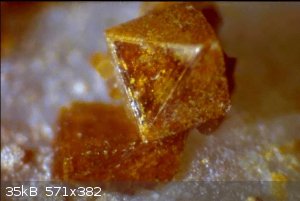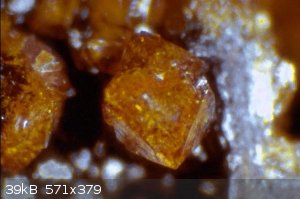
Wizzard - 19-12-2014 at 08:35
Good morning, after a reasonable time away from the forums!!
Came home after a long leave to find all my crystals had dried out! Such excitement.
So, the mystery now is - I was decomposing and filtering my printed circuit board solution (HCl, a dash of KNO3) and found these very small, square
pyramidal crystals of a pretty orange with a darker core - Any clue as to what it might be?
The lead and silver chloride crystals have already been filtered out, so I'm stumped. I am planning on manually extracting them and isolating them in
a solution for analysis. The solution is almost entirely copper. I have not isolated the gold from the solution, but I don't suspect that's what this
is.
Album: http://imgur.com/a/WT4QF#0
aga - 19-12-2014 at 09:50
Iron ?
Ferrous & Ferric chloride maybe.
Wizzard - 19-12-2014 at 11:51
I don't think so, but I'm not positive.
Iron chloride, in my experience, turns to iron oxide slowly as the HCl evaporates, and has been cleaned out.
Secondarily, the crystals do not change color in varying light source directions.
Lastly, they are very air stable - This sample may have been dry for weeks.
Any other ideas?  I'm *hoping* it's some Au Chloride, but I'm not certain at all.
Gold would be lovely, I had expected it was still in solution.
I'm *hoping* it's some Au Chloride, but I'm not certain at all.
Gold would be lovely, I had expected it was still in solution.
[Edited on 12-19-2014 by Wizzard]
[Edited on 12-19-2014 by Wizzard]
deltaH - 19-12-2014 at 23:52
Chloroauric acid is hygroscopic [1]. This sounds a lot like jarosite, KFe[3+]3(OH)6(SO4)2 [2],
but that would require some sulfate/sulfuric acid to be present. Do the crystals look something like this [3]:


The 'jarosite precipitation' or if done slowly, crystallisation, is used in industry as a trick to remove iron selectively from oxidising acidic
solutions. Compare this to precipitating by raising the pH, which is much less selective and can also drop out other metals as hydroxides/oxides.
In fact, whether those crystals of yours are jarosite or not, you may want to look into the field as you could use it to remove out iron impurities
from your leach if so required.
Jarosite is strongly pyroelectric [2][4]... so there's a non-destructive way to test one, simply requires a voltmeter and heat source (but not
flame!).
References:
[1] http://en.wikipedia.org/wiki/Chloroauric_acid
[2] http://en.wikipedia.org/wiki/Jarosite
[3] http://www.mineralatlas.com/mineral%20photos/J/jarositecp.ht...
[4] http://en.wikipedia.org/wiki/Pyroelectricity
[Edited on 20-12-2014 by deltaH]

 I'm *hoping* it's some Au Chloride, but I'm not certain at all.
Gold would be lovely, I had expected it was still in solution.
I'm *hoping* it's some Au Chloride, but I'm not certain at all.
Gold would be lovely, I had expected it was still in solution.